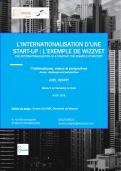Resume
Essentials of Entrepreneurship summary of all articles
- Cours
- Établissement
Summary of the following articles: 1. Shane, S., & Venkataraman, S. (2000) The Promise of Entrepreneurship as a Field of Research. Academy of Management Review 25(1), pp. 217-226. 2. Alvarez, S., & Barney, J. (2007) Discovery and Creation: Alternative Theories of Entrepreneurial Action. Strategic E...
[Montrer plus]












